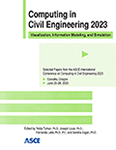Metaverse for AEC: A SWOT Analysis
Publication: Computing in Civil Engineering 2023
ABSTRACT
The metaverse concept as a science fiction concept has been around for a few decades, but new computing technologies have made it a reality in 2021 with Microsoft Mesh for Teams for Hololens, Meta Horizon Worlds and Workrooms for Oculus Quest, Nvidia Omniverse, HTC Viveverse, and many other apps for any type of head-mounted devices. While analysts estimate a market size as high as $13 trillion by 2030, there are challenges ahead. Despite growing interest in the metaverse across various industries, there is currently a lack of literature and research on the topic in the architecture, engineering, and construction (AEC) industry. The objective of this paper is to present the strengths, weaknesses, opportunities, and threats (SWOT) of this new mode of communication based on published articles in other industries. This study highlights the challenges for future efforts involving the implementation of metaverse in the AEC industry.
Get full access to this article
View all available purchase options and get full access to this chapter.
REFERENCES
Alizadehsalehi, S., Hadavi, A., and Huang, J. C. (2020). From BIM to extended reality in AEC industry. Automation in Construction, 116, 103254.
Barrera, K. G., and Shah, D. (2023). Marketing in the Metaverse: Conceptual understanding, framework, and research agenda. Journal of Business Research, 155, 113420.
Boyle, K. Metaverse and Money. Citi GPS, <https://www.citivelocity.com/citigps/metaverse-and-money/ >(May 6, 2023).
Chengoden, R., Victor, N., Huynh-The, T., Yenduri, G., Jhaveri, R. H., Alazab, M., and Gadekallu, T. R. (2023). Metaverse for Healthcare: A Survey on Potential Applications, Challenges and Future Directions. IEEE Access, vol. 11, pp. 12765–12795.
Choi, H.-S., and Kim, S.-H. (2017). A content service deployment plan for metaverse museum exhibitions—Centering on the combination of beacons and HMDs. International journal of information management, 37(1), pp. 1519–1527.
Dayal, R. (2023). How Cost Savings are Driving Wider Adoption of VR in Engineering. <https://thewild.com/blog/cost-saving-vr-adoption-in-engineering > (May 6, 2023).
Dharmawansa, A. (2015). Evaluation For Students’ Learning Manner Using Eye Blinking System in Metaverse.
Duan, H., Li, J., Fan, S., Lin, Z., Wu, X., and Cai, W. (2021). Metaverse for social good: A university campus prototype. Proceedings of the 29th ACM International Conference on Multimedia (MM '21), October 20–24, 2021, Virtual Event, China.
Falchuk, B., Loeb, S., and Neff, R. (2018). The social metaverse: Battle for privacy. IEEE Technology and Society Magazine, 37(2), pp. 52–61.
Feng, X., Wang, X., and Su, Y. (2022). An analysis of the current status of metaverse research based on bibliometrics. Library Hi Tech(ahead-of-print).
Greene, B. (2022). Excerpt: ‘The Hidden Reality’. <https://www.npr.org/2011/01/24/132932268/a-physicist-explains-why-parallel-universes-may-exist > (May 6, 2023).
Hollensen, S., Kotler, P., and Opresnik, M. O. (2022). Metaverse–the new marketing universe. Journal of Business Strategy, Vol. 44 No. 3, pp. 119–125.
Huggett, J. (2020). Virtually real or really virtual: Towards a heritage metaverse. Studies in Digital Heritage, 4(1), pp. 1–15.
Huynh-The, T., Gadekallu, T. R., Wang, W., Yenduri, G., Ranaweera, P., Pham, Q.-V., Liyanage, M. (2023). Blockchain for the metaverse: A Review. Future Generation Computer Systems, Volume 143, pp. 401–419.
Kanematsu, H., Kobayashi, T., Barry, D. M., Fukumura, Y., Dharmawansa, A., and Ogawa, N. (2014). Virtual STEM class for nuclear safety education in metaverse. Procedia computer science, 35, pp. 1255–1261.
Knox, J. (2022). The Metaverse, or the Serious Business of Tech Frontiers. Postdigital Science and Education, pp. 1–9.
Ko, E., and Jang, J. (2014). The Virtual Device Managing Module of the Metaverse Assisted Living Support System. Proceedings of the International Conference on Modeling, Simulation and Visualization Methods (MSV). The Steering Committee of The World Congress in Computer Science, Computer Engineering and Applied Computing.
Mozumder, M. A. I., Sheeraz, M. M., Athar, A., Aich, S., and Kim, H.-C. (2022). Overview: Technology Roadmap of the Future Trend of Metaverse based on IoT, Blockchain, AI Technique, and Medical Domain Metaverse Activity. Proceedings of the 24th International Conference on Advanced Communication Technology (ICACT), PyeongChang Kwangwoon_Do, Republic of Korea, pp. 256–261.
Mystakidis, S. (2022). Metaverse. Encyclopedia, 2(1), 486–497.
Nevelsteen, K. J. (2017). Virtual world, defined from a technological perspective and applied to video games, mixed reality, and the Metaverse. Computer Animation and Virtual Worlds, 29(1), e1752.
Park, S.-M., and Kim, Y.-G. (2022). A Metaverse: taxonomy, components, applications, and open challenges. IEEE Access.
Rehm, S.-V., Goel, L., and Crespi, M. (2015). The metaverse as mediator between technology, trends, and the digital transformation of society and business. Journal For Virtual Worlds Research, 8(2).
Roach, J. (2021). Mesh for Microsoft Teams aims to make collaboration in the’metaverse’personal and fun. Innovation Stories. <https://news.microsoft.com/source/features/innovation/mesh-for-microsoft-teams/> (May 6, 2023).
Roy, A. (2022). Metaverse Meaning–What is this New World Everyone’s Talking About. Zugegriffen am, 8.
Ryskeldiev, B., Ochiai, Y., Cohen, M., and Herder, J. (2018). Distributed metaverse: creating decentralized blockchain-based model for peer-to-peer sharing of virtual spaces for mixed reality applications. Proceedings of the 9th Augmented Human International Conference. Article No.: 39, pp. 1–3.
Sparkes, M. (2021). What is a metaverse. New Scientist, Volume 251, Issue 3348, 2021, Page 18.
Suh, W., and Ahn, S. (2022). Utilizing the Metaverse for Learner-Centered Constructivist Education in the Post-Pandemic Era: An Analysis of Elementary School Students. Journal of Intelligence, 10(1), 17.
Suzuki, S-N., Kanematsu, H., Barry, D. M., Ogawa, N., Yajima, K., Nakahira, K. T., and Yoshitake, M. (2020). Virtual Experiments in Metaverse and their Applications to Collaborative Projects: The framework and its significance. Procedia Computer Science, 176, 2125–2132.
Taylor, C. R. (2022). Research on advertising in the metaverse: a call to action. International Journal of Advertising, 41:3, 383–384.
Information & Authors
Information
Published In
History
Published online: Jan 25, 2024
ASCE Technical Topics:
Authors
Metrics & Citations
Metrics
Citations
Download citation
If you have the appropriate software installed, you can download article citation data to the citation manager of your choice. Simply select your manager software from the list below and click Download.
